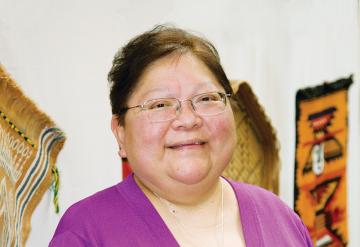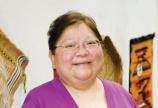It’s common knowledge in communities
- Tara Sharpe

Common knowledge-according to the Canadian Oxford Dictionary-is shared by, coming from, or done by, more than one person. Turn the two words back to front, and multitudinous forms of knowledge find a new base: "knowledge commons" is a term used by community-based researchers for a shared conceptual space which emphasizes the learning that comes from or is done by communities and supports intersections of collaborative thought and traditional wisdoms.
A knowledge commons can help deliver urgent messages as well as preserve culture, hope and learning.
The relationship between the camas lily and the local Coast Salish peoples is one example of the traditional wisdom and community-based knowing that experts such as Dr. Lorna Williams, Canada Research Chair in Indigenous Knowledge and Learning, do not want to see lost. For generations, the blue camas lily has been selectively cultivated by the Lekwungen people of the Songhees First Nation. Generational knowledge of this edible root food is integral to ecological restoration efforts involving the lily, whose bright blue tips once formed a vast colourful carpet across the local landscape.
Other examples include how to creatively adapt technologies for children with special needs and how best to supply mobile tent projects for people who are homeless-both initiatives already undertaken by UVic researchers.
Williams has been at the forefront of national news lately, in particular with respect to the perilous situation involving First Nations languages, which was the focus of her keynote presentation on June 2 at the Canadian Knowledge Commons summit in Montr&e#180;al.
Williams is Lil'wat from the St'at'yem'c First Nation and an assistant professor in UVic's Faculty of Education and Department of Linguistics as well as former program director of UVic Aboriginal Education. She is also the chairperson of the First Peoples' Council, located on Wsanec traditional territory in BC. On April 30, the council released its first annual Report on the Status of BC First Nations Languages, starkly revealing the troubling state of BC's First Nations languages.
The situation in BC is a variation of the situation of all Indigenous languages in Canada. The council's report did also provide positive examples of Aboriginal language revitalization-an effort that Williams has been closely engaged in for some time.
"It's important to recognize and acknowledge that when people made or make their homes on the lands we now call Canada, that they take on the heritage of the languages located on those lands," says Williams. "It's extremely important that the public recognizes all Indigenous languages as their herita#8805; then governments must respond to ensure the knowledge and wisdom embedded in the languages are protected. These languages exist nowhere else in the world."
The knowledge commons event coincided with the Congress 2010 of the Humanities and Social Sciences in Montr&e#180;al, which incidentally became the staging ground for the signing of a landmark accord on the education of Indigenous peoples.
Williams reflects upon the events in Montr&e#180;al this month, saying, "I came away from Montr&e#180;al and the congress with a feeling of hope and optimism. With the signing of the Accord on Indigenous Education, there is a set of guidelines that each faculty of education can use, in dialogue with its Indigenous communities, to build Indigenous education into the fabric of their faculties. Making the changes necessary to the education of people of Indigenous and non-Indigenous heritage requires partnerships and collaboration where knowledge can be shared and exchanged. We are at a time when we realize that we can learn from each other to live wisely on this earth."
Dr. Budd Hall of UVic's Office of Community-Based Research (OCBR) is the architect of the Canadian Knowledge Commons initiative and was a keynote panelist alongside Chad Gaffield, president of the Social Sciences and Humanities Research Council of Canada, who joined 150 other scholars, community leaders and research funders at the summit.
Hall says, "We are putting out a call for the renegotiation of the understanding of knowled#8805; knowledge is produced in the village market as well as the ivory tower. A thousand years ago, knowledge was available as people needed it, because most lived in communities where knowledge-keepers and users were located in the same vicinity. Over time, knowledge has ended up in silos with knowledge-keepers and users separated from each other. The knowledge commons approach brings it all back together."
"We have to remember the wisdom-keepers are aging," finishes Williams. "And we are really under pressure to ensure we document and record these wisdoms before it is too late."
More info: www.uvic.ca/ocbr, http://knowledgecommons.ning.com and www.congress2010.ca

